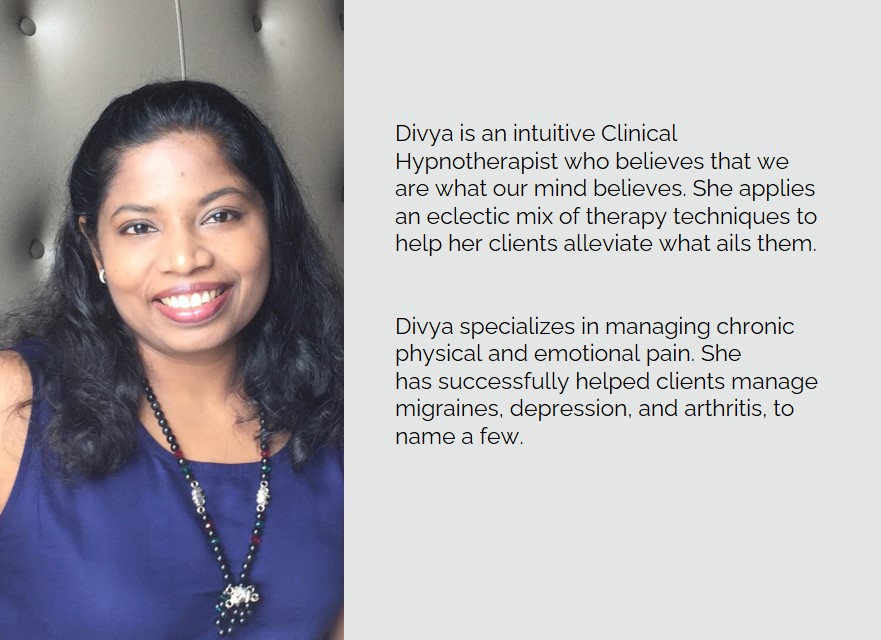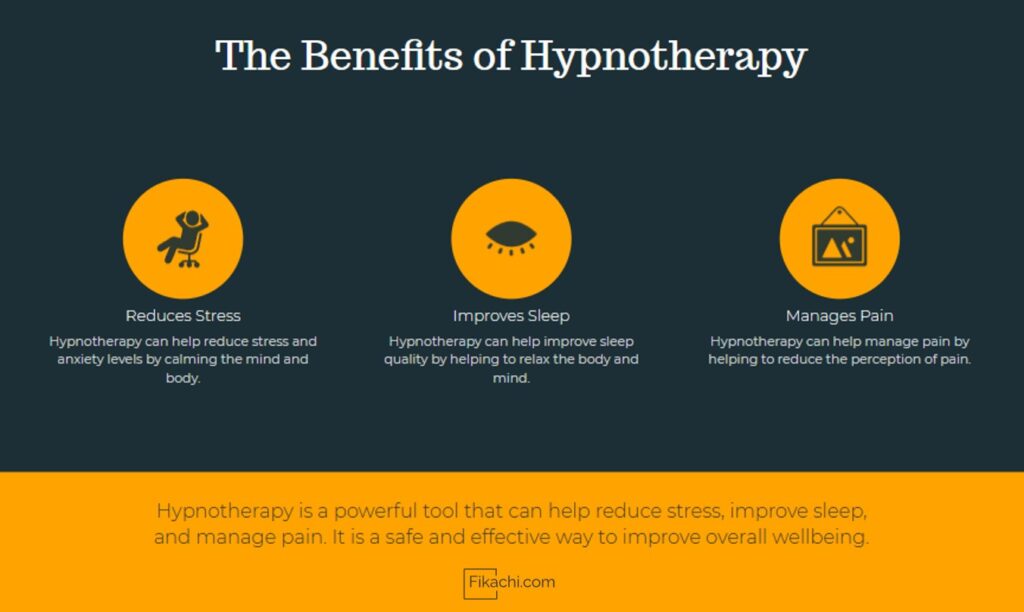Our subconscious mind holds many secrets and sometimes unknowingly we harbor a lot of negative thoughts. By tapping into our subconscious mind, we can facilitate positive thinking patterns, feelings and behaviors.
Allow yourself to see what you don’t allow yourself to see.
Milton H. Erickson
Nowadays, we see hypnotherapy gaining popularity as a complementary and alternative approach for enhancing well-being. Hypnotherapy is hypnosis used as a therapy. It combines hypnosis with therapy to improve overall wellness and address physical, emotional, and mental issues. It is the only counselling, talking therapy that enables you to work directly with your unconscious / subconscious mind.
Today, lets meet Divya Damodaran a skilled and certified hypnotherapist who has helped countless individuals enhance their well-being through the power of hypnosis. Divya is a MSCH & BSCH registered therapist and guides her clients to go into a trance-like state during hypnotherapy sessions, helping them achieve heightened focus, increased responsiveness to suggestions, and deep relaxation. Her sessions aim to help clients overcome fears and phobias, as well as self-limiting and self-destructive thoughts, habits and suppressed emotions.

We’ve asked her some questions to get her insights into the benefits of hypnotherapy and how it helps tackle the issues that hold one back on a subconscious level.
1.What inspired you to become a hypnotherapist, and how did you get started in this field?
I was a software developer before I decided to take a career break to bring up my young children. It is the work-life imbalance and stress that made me decide to leave my corporate job in London and provide my children a positive childhood experience. I explored Pranic healing meditation, went for a retreat in Rishikesh and camped near the Ganges banks. I realized how our mind is our most powerful friend and enemy. How we perceive our thoughts, can make or break us. I also observed that the modern lifestyle was causing a lot of stress related issues amongst current generation and people were seeking medication to solve many issues whereas the solution was right within themselves. During the lockdown I came across the medical aspects of hypnotherapy and learnt how we can use the power of our subconscious to manage many mental and health issues. I decided to use all the spare time to obtain my Practitioner’s diploma in Clinical hypnotherapy. I am a BSCH (British Society of Clinical Hypnotherapy) and MSCH (Malaysia society of clinical hypnotherapy) registered therapist.
2.What are some of the most common issues that your clients seek hypnotherapy for, and how can it help with those issues?
The most common issues that adults face today is stress and anxiety due to work and relationship. Many clients have reached out seeking help for Insomnia or chronic headaches only to discover that the root cause was undisciplined lifestyle and stress.
Feeling stressed or tense for prolonged periods can have a negative effect on our overall well-being. Research studying the relationship between stress and health shows that stress not only affects our mood but can also lead to health implications. This includes digestive problems, bowel conditions and high blood pressure. It is also thought to lower our immunity and slow our body’s recovery from major traumas.
So, while you may not think you’re overly stressed, it is important to watch for the signs of excessive levels of tension and stress:
Signs and symptoms of stress
- tense muscles
- waking up tired
- difficulty sleeping, persistent tiredness or exhaustion
- grinding your teeth
- aches and pains
- feeling neglected or lonely
- heart racing
- sense of rush, panic or lack of time
- growing number of minor ailments such as headaches or stomach upsets
- ‘Stomach in knots’ sensation
- loss of appetite
- difficulty thinking straight or concentrating
- feeling angry, impatient, irritable, or wound-up
- inability to enjoy yourself, or loss of interest in life
- feeling anxious, nervous, or afraid
Relaxation techniques are thought to be key to restoring or maintaining a healthy body and mind. Some relaxation exercises are designed to help slow down your breathing and heart rate, which can help to lower blood pressure and muscle tension. Relaxation can also help you to gain control of your worries and can help you to learn other skills, such as mindfulness.
3.How can hypnotherapy be used to improve physical health, as well as mental and emotional well-being? What would you say are some of the common causes of stress in modern society that your sessions address?
Clinical Hypnotherapy is a combination of advanced psychological techniques which teaches the client to use deep relaxation to address their issues. During this relaxed state, the client experiences changes in sensations, perceptions, thoughts, or behaviour. Over a few sessions the client will usually make small changes to their daily routines, resulting in a more disciplined lifestyle. With daily journaling and listening to custom guided relaxation, the clients observe a clear change in their issues. Research done over the years shows that this form of therapy helps with many underlying issues like anxiety and stress. It can boost energy levels and improve daily habits. Hypnotherapy has been credited with helping people get rid of bad habits like smoking, alcoholism, binge-eating. Hypnotherapy also treats acute and chronic pain, burns, headaches and backaches. In fact, experts have also said that hypnotherapy can calm a hypersensitive gut, thereby treating IBS.
We have more stress related ailments in this generation. The cause is uncertainty in relationships, reduced social support and lack of routine to name a few.
We are also seeing more cases of post-natal depression than ever before. Few decades ago, a young mother was supported by the whole family in recuperating from childbirth and raising the child. In modern times, she has to deal with everything by herself, with minimal support from family and friends. I also counsel young parents to prepare for this new phase in their life. PND depression also affects the new father. Although not much spoken about, it is stressful for the new father to cope with new changes in his household.
Just like how we warm-up before a challenging workout, I would advise everyone to mentally warm-up by speaking to a mental health specialist before taking any important step in life.

4.In your view, what are some of the most effective hypnotherapy techniques for promoting relaxation and reducing anxiety?
True relaxation will help to ease your mind, switching off from the external noises in your life. Hypnotherapy is a recognised form of relaxation therapy. It can reduce ‘stress chemicals’ and bring the body back to balance. Regular sessions ease built-up pressure and tension, helping you to learn how to look after yourself better.
There is no single method of relaxation that is best for everyone. Some people will benefit from therapies such as hypnotherapy, whilst others may prefer solo relaxation techniques, such as meditation or Progressive Muscle Relaxation.
Working with a qualified, professional hypnotherapist provides a confidential and comfortable setting in which your mind and body can be safely filtered of tension and stress, easing you into a relaxing state of mind.
5.How important is a healthy lifestyle in promoting overall well-being, and what tips do you have for individuals who are looking to make positive lifestyle changes?
Leading a healthy lifestyle can involve eating nutritious foods, engaging in regular physical activity, and prioritizing your mental health.
Physical fitness is not the sole basis of being healthy; being healthy means being mentally and emotionally fit. Being healthy should be part of your overall lifestyle. Living a healthy lifestyle can help prevent chronic diseases and long-term illnesses. Feeling good about yourself and taking care of your health are important for your self-esteem and self-image. Maintain a healthy lifestyle by doing what is right for your body.
Like I said before, how we perceive our thoughts can make or break us. When you find yourself in stressful situations, be hopeful of an amicable solution. A positive attitude can boost your energy, heighten your inner strength, inspire others, and garner the fortitude to meet difficult challenges.
Your journey toward a healthier lifestyle starts with small changes that you feel confident you can achieve. Consider making “SMART” goals. SMART stands for:
- specific
- measurable
- attainable
- relevant
- time-bound (met by a deadline and done in a certain amount of time)
When you focus on SMART goals, you could find more success. And one initial “win” will propel you to set new, bigger goals.
6. Finally, what advice do you have for individuals who are interested in exploring hypnotherapy as a tool for improving their health and well-being?
Hypnotherapy is a safe procedure when done by a trained therapist. Hypnotherapy isn’t mind control or brainwashing. Hypnosis is usually used along with other therapies and treatments, as part of a complete total treatment plan.
If interested in trying hypnotherapy, look for a healthcare professional who’s properly trained, licensed and registered with a reputable organisation such as BSCH or MSCH. Ask the practitioner you intend to see about their training, credentials and license to practice hypnotherapy. Also ask if they’re experienced in the condition(s) you’re seeking care for.
You’ll want to find a therapist you feel comfortable with and trust. Don’t hesitate to try a different therapist if you feel a hypnotherapist isn’t the right fit for you.
Inconclusion, as Divya has shared, the benefits of hypnotherapy are profound and can positively impact individuals’ lives. You can check more about Divya here.
Change your life for the better with hypnotherapy and improve your overall well-being with a qualified and certified hypnotherapist.




